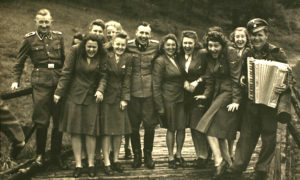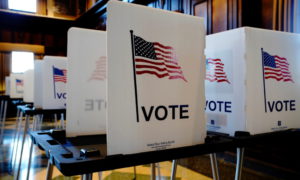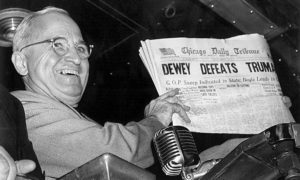Senate Liberals feared that a unified Democratic denunciation of Senator Joseph McCarthy. They feared it would only result in the G.O.P. uniting against what they would perceive as a partisan attack on one of their own. Many felt in Congress that the responsibility for stopping McCarthy was that of the Republican party elite.
The Republican elite hesitated to take on McCarthy for two reasons. First, McCarthy had a reputation as a political powerhouse whose endorsement or opposition could make or break candidates in their election bids. When crossed by fellow Senators, McCarthy would take action to defeat his critics in their reelection campaigns. Senators saw McCarthy’s opposition to Senators Tydings, Lucas, and Benson as a critical reason for their defeats. This reputation as a power-to-be-reckoned-with intimidated many would-be critics into remaining silent. McCarthy enjoyed the stature of being a “giant killer.”
Senator Margaret Chase Smith had criticized McCarthy’s methods in her “Declaration of Conscience” speech to the Senate. McCarthy responded by encouraging a Maine native on Senator Potter’s staff to enter the Republican primary against Smith. McCarthy then flew to Texas and raised funds for the challenger’s campaign. Although Senator Smith’s challenger was unsuccessful, other Senators realized the high cost involved in challenging McCarthy.
The second primary reason that the Republican elite did not condemn McCarthy earlier was McCarthy’s attacks on Democrats were useful in election campaigns. Issues that McCarthy raised allowed Republicans to campaign against Democrats as being “soft on Communism.” The Wisconsin Senator’s free-swinging accusations helped end the twenty years of Democratic control of the Executive branch.
After Eisenhower’s election, the Republican party urged McCarthy to drop his investigations of government subversives because they did not want to embarrass the party. Members of the Republican elite, such as Richard Nixon, saw that the anti-communist issue had served the party’s purposes and that it was time to move on to other matters. Regular Republicans had dropped the anti-communist theme and urged McCarthy to shift his investigations to crime and corruption.
Such investigations into racketeering helped propel politicians like Estes Kefauver and John F. Kennedy into national prominence and eventually to national party nominations. McCarthy considered this shift of focus to crime. He had gone from obscurity to a national figure with a large war chest, all due to his anti-communist crusade.
McCarthy rejected the shift and continued to hammer away at the communist issue. He refused to become a “loyal party man.” McCarthy soon expanded his “twenty years of treason” to twenty-one. Still, Republicans hesitated to turn on McCarthy.
Eisenhower thought that a rebuke from the Chief Executive of a member of the legislative branch would only result in fellow legislators lining up behind McCarthy. He thought Legislators would perceive his rebuke as a duel for power between government branches. McCarthy could not have risen to and maintained a position of influence without the consent- or at least the impartiality- of the G.O.P. establishment.
The Republican party at first encouraged McCarthy’s attacks for the party’s self-interest- electing candidates and bedeviling the opposition. By the time McCarthy became a political renegade, the Republican party elite had grown to fear him.
The G.O.P. had been silent on McCarthyism until it had become a national hysteria. The Republican elite did not respond formally to McCarthy until television had all but done him in.
Madisonian Republicanism and populism sound like counterpoints to each other. In the McCarthy era, the establishment was painfully slow to react to an extreme threat to civil liberties. Perhaps the reason for the delay of response was because of confusion surrounding the substance of McCarthyism. McCarthy’s threat to the established powers was one-dimensional- he had no program of his own which he would implement. He sought no higher office, raised no army, lead no constructive movement. Rather than being the fascist which many accused him of being, McCarthy was something of a nihilist. Having no McCarthy program to discredit or run against, the Republican establishment hoped that McCarthyism’s threat would ‘punch itself out.
Sources:
https://www.amazon.com/Senator-Joe-McCarthy-Richard-Rovere/dp/0520204727
https://www.amazon.com/Without-Precedent-Story-Death-McCarthyism/dp/039330230X
https://www.amazon.com/s?k=levin+political+hysteria&i=stripbooks&ref=nb_sb_noss
https://www.amazon.com/Politics-Ideas-Political-Theory-American/dp/0881335126/ref=sr_1_1?dchild=1&keywords=herson+politics+of+ideas&qid=1617105862&s=books&sr=1-1
https://www.amazon.com/Mccarthy-Roy-Cohn/dp/112532659X/ref=sr_1_1?dchild=1&keywords=roy+cohn+mccarthy&qid=1617105910&s=books&sr=1-1
https://www.amazon.com/Nightmare-Decade-Times-Senator-McCarthy/dp/039446270X/ref=sr_1_1?dchild=1&keywords=cook+nightmare+decade&qid=1617105949&s=books&sr=1-1
https://www.amazon.com/Present-Creation-Years-State-Department/dp/0393304124/ref=sr_1_1?dchild=1&keywords=acheson+present+creation&qid=1617106019&s=books&sr=1-1
https://www.amazon.com/Days-Shame-Charles-Potter/dp/1125182334/ref=sr_1_1?dchild=1&keywords=potter+days+of+shame&qid=1617106065&s=books&sr=1-1
Thanks and a tip of the hat to Wikipedia for the image.




















